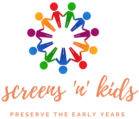Today as we were driving with my son who is 5 we passed an “Adult store” selling adult merch. He is learning how to read so I heard him pronounce slowly “D..V..D.”. and immediately he said, “mom they keep DVDs there!” I almost choked up a bit when I thought about his innocence and the world that awaits. Adult content is not a new phenomenon – we have definitely evolved from playboy magazines under beds. I just feel nowadays it is so accessible, available at the click of a button or even popping up in gaming platforms etc etc. So I muttered under my breath, ‘Yes honey, there are DVDs.” To be honest I was tongue tied.
Childrens online safety is one of those topics in this space that for me I really struggle with. It feels like try as we may online predators are just everywhere lurking, pornography is left right center that it almost feels like a battle with an already declared victor. But there is an account I follow run by Barb Winters – it is called Difficult Conversations that gives me hope. She started this platform after her son confessed he had been watching porn for a while and the only reason he opened up was the predator said he would call the police. Her premise is have these difficult conversations and have them early and often. I think what also triggered me to write this post is a Facebook group I am a part of called Screen strong families just this morning a mum posted how she was looking for support after her 7 year old was shown naked women by another 7 year old on the bus to school. Why why??
I gained some tips from my conversation with Jenny Hoey from Australia who also started an online platform – Not my kid after her daughter had an encounter with an online predator at just 9. You can listen to the podcast episode here. Some things she mentioned are :1 .) Respond with empathy to your child ALWAYS such that when they ever experience something that is confusing or feel as though they have “messed up” they know they have a safe place to land. 2. )Prepare, prepare prepare – with online adult content and kids its not a matter of if they will stumble upon it, its a matter of when and what will they do when they encounter such content. 3.) Normalize calling body parts by their names. My son knows he has a penis. Growing up, sexuality and sex was such a taboo topic. If we normalize these feelings and conversations more I think kids will be more self aware and no when they are beginning to tread into murky waters. 4.) Consent, consent consent – from an early age – give kids agency over their bodies, their emotions, their feelings etc. This may not be popular in some circles but if a child is not comfortable giving a hug to uncle so and so or new friend such and such then so be it. Do not force it, guilt trip them etc. Because that normalizes that it is okay to have someone do as they please even after you said no. Let their no be no. There is a great book called Good Pictures, Bad pictures and you can grab junior version as well for little. It is a great read if you have little ones and acts as a guide on how to start having these conversations because the stats show that kids are being exposed to porn as early as 8.
So have these discussions and have them often because the worst conversation to have with a kid about online safety is no conversation. Equip them with the tools they need to head into the digital battlefield because a prepared child is less of a target online.

